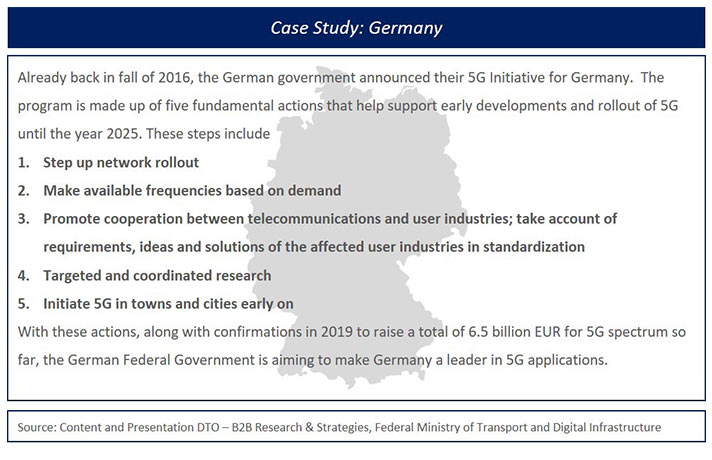
Connecting German Manufacturing with 5G – What is the current status of 5G technology and why is its industrial development important?
2025 is the new goal year in sight for 5G. By then, countries, like Germany, are aiming to significantly rollout 5G allowing 5G networks to reach 1/3 of the world’s population. But what will we be able to expect from 5G then? What does it bring to industry 4.0’s table, where manufacturers have been eating from the past decade? In this article we will be going over the development of 5G, interesting areas of potential for manufacturing industries that have opened up and the strategies that are being taken to achieve that potential. Interested? Then let’s get connected.
The Development of 5G
5G is the “fifth generation” of telecommunication systems that builds off of existing 4G LTE standards. The difference of this generation includes higher bandwidth and very low latency, meaning better, faster, and more reliable connections between us users, as well as objects and machines such as our self-driving Teslas and smart buildings. 5G allows for real-time data compilation and analysis making it a valuable asset for Artificial Intelligence (AI) and the Internet of Things (IoT).
Why will 5G be so important for manufacturing?
To put it simple, flawless network production is only really possible with 5G. Being about 100x faster at transferring data than LTE, the fifth generation allows for real-time communication between people, systems, sensors and machines. What difference does this make for manufacturing? The potential from 5G allows manufacturers to increase their competitive strength, firstly, though continued gains in efficiency. This type of connectivity allows pick and place machines to operate with extreme precision. It allows transportation systems to identify obstacles at rapid speeds. 5G, however, does not only improve old technology that can technically run on 4G, it also creates potential for absolutely new technologies allowing for profitability created from new process innovations. For example, connected/ smart goods provide the opportunity to create new value-added-services, which is something that is becoming more important to manufacturers than actual products themselves. The demand for new value-added-services in manufacturing is one of the leading drivers for 5G in the manufacturing sector.
Factory 56
The European 5G Observatory stated that as of December 2019, 181 5G trials and pilot projects have been carried out in the, at the time, 28 EU member states alone. One project that has caught a lot of attention is Mercedes’s Factory 56 in Sindelfingen. The world’s first factory to use 5G network for automobile production is being developed by Telefónica Germany and the network infrastructure provider, Ericsson, alongside Mercedes-Benz Cars. The 5G facilities allow production processes to be optimized even more than they were by providing features such as product tracking while on the assembly line. Test scenario data can also be rapidly processed and mobile communications between production machines (M2M) are enhanced. All things considered, production processes are not only optimized but have become flexible and fast enough to adapt to short-notice market conditions.
Strategically Rolling Out 5G
The potential of 5G in manufacturing looks very attractive, but 5G is met both with eagerness, as well as demission from mobile operations. The value that arises from 5G opportunities and implementation of IoT practices in manufacturing (estimated around 113 billion USD in 2026) will be met with the need for large infrastructure investments. This being said, the increased traffic estimated to take place in the next 5 years takes away the possibility of being able to conservatively invest into this technology. Fortunately, operators and private investors are not the only parties involved. Government administrations have been planning strategies to be able to act and invest accordingly into this technology generation.

The Waves that Will Connect Us All
Who will be the next big manufacturers to implement 5G into their production? When will 5G reach the German “Mittelstand”, a.k.a small to medium-sized companies? We will continue busying ourselves with the development of 5G to find answers to these questions and more. Despite being in hard times, production should be looking forward. Technology advancements will not necessarily slow down and innovative thinking is especially important in times of crisis. It can be the reason if companies reposition themselves successfully or close their doors. The waves of 5G will hit shore soon, are your manufacturing processes ready for it?
If you want to know how your products can benefit from the developments of 5G, need support in analyzing global markets or are planning a market entry or market development strategy, please contact us. We will be happy to discuss with you the possibilities and research designs that will enable you to optimally align yourself with the future markets of this world.